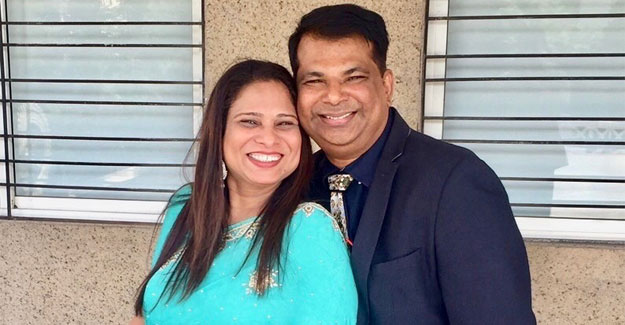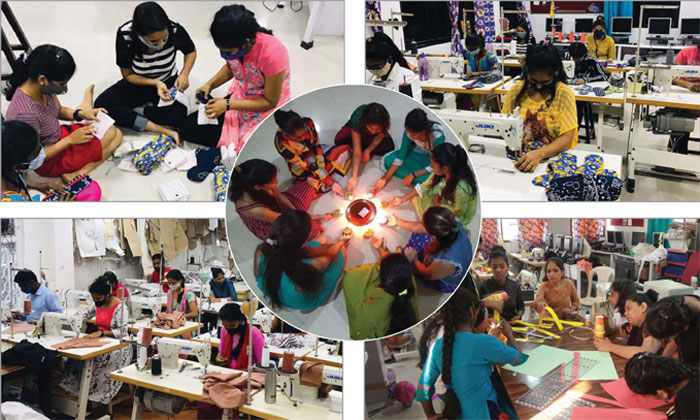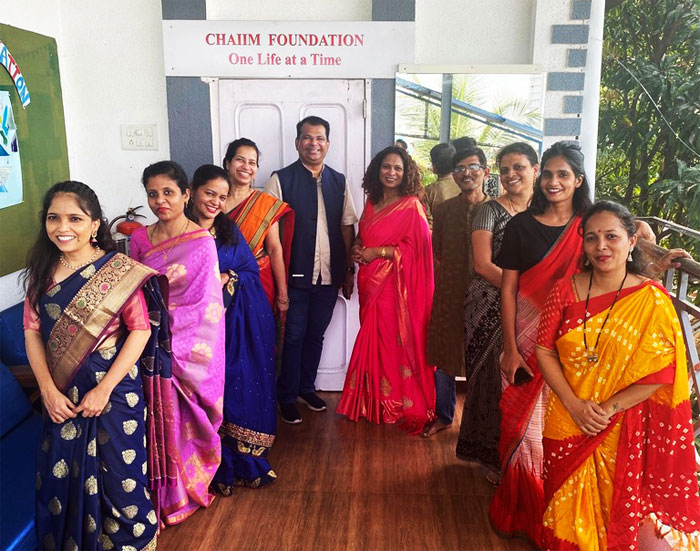
Chaiim Humanitarian – Giving Survivors Of Human Trafficking A Life Of Dignity
CHAIIM means Life. Every living creature on this planet has the right to a happy, safe, respectful life. Chaiim Humanitarian and Chaiim Foundation were set up by Keith and Ramona Daniels to ensure a safe and dignified life to women who are survivors of human trafficking. Chaiim Foundation - One Life at a Time The journey of Chaiim Humanitarian started some years after the setting up of Chaiim Foundation. Keith Daniels, Co-Founder & CEO, Chaiim Foundation relates how the NGO came into being. “Some years ago, we came face-to-face with girl trafficking. Girls that were barely 14-16 years old were getting trafficked. It shook my world. Generally, as a society, we are aware of such things, but they are too distant from our sheltered lives. I started to question the kind of society we were living in. I started to do some in-depth research, and realised how deeply entrenched this evil was in our society. I learnt that the demand was highest for girls in the age group of 12-14 years. The misery and horrors that these girls were going through was unimaginable. It was something we just could not put behind us, and carry on with our lives as usual. What kind of human beings would we be if we could?”
“You may choose to look the other way but you can never again say you did not know.” William WilberforceHis business partner, and wife, Ramona Daniels worked with the National Stock Exchange, and had left this cushy job to work with an NGO that rescued trafficked girls. Keith, an adman, after this horrific exposure, quit his job too. The husband-wife duo was clear in their minds and hearts that this was their life purpose – attempting to RESTORE human trafficked victims back into society. “We decided the first step should be an after care home. We perceived that the rehabilitation and the restoration process could be bettered from the already existing ones. One thing was very clear that we would improve on quality restoration and not quantity.” So, Ramona and Keith focussed on rehabilitation and restoration - “One life at a time” “I realised this - if this girl was my own daughter then I would be doing something very special for her. Luckily, friends too came out to support this endeavour. Our confidence was building up. And the aim was to give the girls a home just like ours,” said Keith. [caption id="attachment_23490" align="alignnone" width="700"]
 Chaiim’s 7-pronged model - healthcare, counselling, education, life skills, vocational training, housing and job readiness – is the foundation of the training programme that restores a girl back to community and life.[/caption]
Chaiim’s 7-pronged model
The duo made a list of things that these girls and women would need – healthcare, counselling, education, life skills, vocational training, housing and job readiness . This 7-pronged model is the foundation and bedrock of the training programme that restores a girl back to community and life. This training programme runs for 18 months. This process works well for some women whereas for the others, probably they need more time to heal.
“We try to ensure that the girls complete at least their 12th standard. And I am proud to say that many have even completed their graduation. We impart vocational training – garment manufacturing, candle making, soap making, Warli art, backend office work, and much more. The counselling and mentoring sessions are of immense importance to take care of the trauma and mental health, because of the sexually abused past that they have been subject to due to no fault of theirs.We have tied up with some healthcare facilities too.”
“We give them a care package twice a year, which contains everything that every girl would need, from clothes, footwear, medicines, etc,” he said.
Chaiim Foundation gives these women an identity. “With the help of the local authorities and a Bank, we get their Aadhar and PAN cards made. With this identity, the girls gain more confidence, they realise that they can start to save some money, we help them to open bank accounts too. We help them to get clarity and stay focussed whether in finding a life partner, settling down or gearing up for career growth. We do background checks, to ensure that our girls live a happy, safe life.”
[caption id="attachment_23491" align="alignnone" width="700"]
Chaiim’s 7-pronged model - healthcare, counselling, education, life skills, vocational training, housing and job readiness – is the foundation of the training programme that restores a girl back to community and life.[/caption]
Chaiim’s 7-pronged model
The duo made a list of things that these girls and women would need – healthcare, counselling, education, life skills, vocational training, housing and job readiness . This 7-pronged model is the foundation and bedrock of the training programme that restores a girl back to community and life. This training programme runs for 18 months. This process works well for some women whereas for the others, probably they need more time to heal.
“We try to ensure that the girls complete at least their 12th standard. And I am proud to say that many have even completed their graduation. We impart vocational training – garment manufacturing, candle making, soap making, Warli art, backend office work, and much more. The counselling and mentoring sessions are of immense importance to take care of the trauma and mental health, because of the sexually abused past that they have been subject to due to no fault of theirs.We have tied up with some healthcare facilities too.”
“We give them a care package twice a year, which contains everything that every girl would need, from clothes, footwear, medicines, etc,” he said.
Chaiim Foundation gives these women an identity. “With the help of the local authorities and a Bank, we get their Aadhar and PAN cards made. With this identity, the girls gain more confidence, they realise that they can start to save some money, we help them to open bank accounts too. We help them to get clarity and stay focussed whether in finding a life partner, settling down or gearing up for career growth. We do background checks, to ensure that our girls live a happy, safe life.”
[caption id="attachment_23491" align="alignnone" width="700"] Ramona and Keith Daniels with their staff – Helping to create a life of dignity[/caption]
“This place offers them a lot of stability. Restoration is fine-combed daily in every survivor’s life at the aftercare home and at the training programme. I think we are the only NGO that will ask if you are okay even if you just sneeze,” says Keith.
“All of these efforts are towards helping them to get back to a normal life in society. Many of the women who came to us have never had their birthdays celebrated. We make a big deal about their birthdays. We also organise picnics and trips for them twice a year. And I realised that some of them had probably never had a chance to see the free, outside world. These are heart-wrenching moments for us.”
In the initial years, Keith and Ramona used their own finances, and support of family and friends to run this initiative. They had to work hard to build the trust within the system, so they could continue with their work.
Ramona and Keith Daniels with their staff – Helping to create a life of dignity[/caption]
“This place offers them a lot of stability. Restoration is fine-combed daily in every survivor’s life at the aftercare home and at the training programme. I think we are the only NGO that will ask if you are okay even if you just sneeze,” says Keith.
“All of these efforts are towards helping them to get back to a normal life in society. Many of the women who came to us have never had their birthdays celebrated. We make a big deal about their birthdays. We also organise picnics and trips for them twice a year. And I realised that some of them had probably never had a chance to see the free, outside world. These are heart-wrenching moments for us.”
In the initial years, Keith and Ramona used their own finances, and support of family and friends to run this initiative. They had to work hard to build the trust within the system, so they could continue with their work.
“To be born poor in this world is to be born vulnerable and in danger of exploitation. To be born female and poor is like waiting for a crime to happen” - Chaiim Foundation“We learned as we worked. We had to undo many things we learnt in the corporate world and relearn human ways to bring sanity in the work we were doing. We started to ask for CSR funds. We brought in professionals for our backend work, for fund raising, admin, etc. We deployed professionals (all MSWs) welfare officer, programme officer, counsellors, healthcare workers. In the last 10 years, we have catered to around 182 survivors. Some are now married, some are working, some rehabilitated with their families. Some of them are employed in our own garment facility too.” Chaiim Humanitarian – “We Celebrate Women” Chaiim Humanitarian Clothing is a private limited company, a profit making company, a company that follows the principles of fair trade. “The model is that we need a profit centre to support our social work which is growing fast. We don’t want to be donor driven always,” say Ramona and Keith. “When a girl walks into our foundation, she is a trainee, she earns a stipend. We give a stipend because we don’t want them going back to the trade. After the 18-month vocational training, girls who show a strong inclination for garment sewing, are inducted into the company, Chaiim Humanitarian.” Keith and Ramona have connected with friends from across the globe who have their own private labels. “These friends came forward to help us train our girls in fashion designing, garment sewing. They give us the orders. And the profits go back into the social work that we are doing,” said Keith. The company manufactures 4,000 pieces of apparel per month, and has the capacity to move up to 6,000-7,000 pieces. The company exports to USA, Europe, UK, Australia. Fair Trade is the right way Ramona handles the entire production. “Chaiim Humanitarian is in the process of getting Fair Trade certified. I want GOTS certification too, but our business is small, these certifications are quite costly. So, even as I do not have a GOTS certification, I still follow all the guidelines. All the inputs we use are GOTS certified.” Says Ramona, “For the last 18 years, I have been an avid follower of fair trade and fair environment. I advocate this even more because we come from the corporate sector, where everything isn’t as good as it appears to be. I don’t believe in greenwashing.” Ramona runs the garment production unit a little differently. “There is always a mix between the NGO and the company because I want the NGO girls to see and experience the professionalism that exists outside, while having a happy work ambience. We try to ensure that they experience a normal life and work environment which they were not blessed with till now.” Besides a fair work environment, Ramona is equally passionate about delivering the best to her buyers. “I cannot give you a production of 10,000 pieces a month, but I can surely give you a production of 6,000 high quality pieces. So I have to severely cut ends, but I want to deliver excellence. Right now the only person I’m trying to please is myself. When I look into the mirror I ask myself at the end of the day, was this the perfect job done or did you try to fit into the rat race. I don’t think I fit into the rat race or I want to.” But such ethics (ethical and sustainability) do not find an easy market. “This is a very niche market. We have a very small market in Europe, and other places. Unfortunately, everyone wants rates that are for small orders. And we do end up losing many orders as fabrics have their own MOQ (minimum order quantity).” Which leads to the next big obstacle for her – sourcing GOTS and Fair Trade certified fabrics in small lots. “With our production capacity, I want 250 meters or so of a particular kind of fabric, but the vendors insist on minimum orders of 500-1000 meters. I really struggle with fabric sourcing. The odds are against small producers.” Ramona is looking forward to ease of ecommerce, and online purchases for B2B fabric and input sourcing. “I think it’s time for fabric makers to recheck, rework, refocus their strategies.” And then there are the other overhead costs that can be quite crippling. “We consciously took the decision of having the NGO in Mumbai suburbs. This is a peaceful locality, it’s close to the utilities such as education institutes, healthcare facilities, banks and every form of ease of work etc. Our vision is that the girl gets connected to society in every possible aspect. But this has its costs. It prevents us from expanding, as we have just that much space, which is on lease.” Getting workers is not easy either. “We have our girls working here, but we also need respectable people from the trade, who have the experience. However, they find it difficult to settle into our style of different working conditions. We today have some workers who are sample workers, they make only samples. They are a better fit with us. Then we have four rounds of quality checks too per garment”. Ramona boasts of never having gotten any merchandise returns. “That’s what we can boast about, that is our strength, our USP.” Another impactful initiative Ramona and Keith have started one more social project called `DAAG’. Under this, the NGO trains rural women, and urban poor women in slums in manufacturing reusable sanitary napkins. These are distributed free of cost to the marginalised women in urban and rural areas. “This again is donor driven.” Currently, around 10,000-12,000 women are impacted by this initiative. We are now in the process of taking a decision on whether this can be partly profit driven. This becomes essential to be able to continue the initiative.” The Vision Chaiim Foundation wants to move away from being solely donor driven. “We’ve given ourselves a target of 2023 end to be able to do this.” The NGO expects to impact another 100 or so survivors by end of 2023. And expects to ramp up production to 5,000-7,000 pieces a month by then. “The main objective behind all this is to impact and change many more survivors’ lives,” say Ramona and Keith. (Chaiim Foundation can be reached at contact@chaiim.in. You can visit www.chaiimfoundation.org for more information)

Textile Excellence
If you wish to Subscribe to Textile Excellence Print Edition, kindly fill in the below form and we shall get back to you with details.












